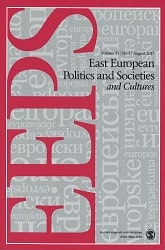Sites That Haunt: Affects and Non-sites of Memory
Sites That Haunt: Affects and Non-sites of Memory
Author(s): Roma SendykaContributor(s): Jennifer Croft (Translator)
Subject(s): Local History / Microhistory, Political history, Social history, Studies in violence and power, Victimology, History of the Holocaust
Published by: SAGE Publications Ltd
Keywords: sites of memory; non-sites of memory; Warsaw ghetto; Płaszów; Concentration Camp; affective analysis;
Summary/Abstract: In this article, the author seeks to establish whether specific sites from Eastern Europe can be viewed as loci critiquing Pierre Nora’s seminal notion of lieux de mémoire. The sites in question are abandoned, clandestine locations of past violence and genocide, witnesses to wanton killings, today left with no memorial markers or inadequate ones. Without monuments, plaques, or fences, they might be understood as “completely forgotten,” as Claude Lanzmann once claimed. In opposition to that view, in the article the locations in question are interpreted as still potent agents in local processes of working with a traumatic past. Sites of mass violence and genocide are described as unheimlich and trigger strong affective reactions of fear, disgust, and shame whose actual causes remain unclear. This article analyzes possible catalysts of these powerful affective responses. The first hypothesis is grounded in the abundance of ghost stories in literary or artistic representations of the sites in question. The second hypothesis addresses the issue of the presence of dead bodies: human remains have never been properly neutralized by rituals. And finally, the third hypothesis explores the “effect of the affects” of non-sites of memory as the capacity of bodies to be moved by other bodies, the bodies affected in this case being those of the visitors to the uncanny sites.
Journal: East European Politics and Societies
- Issue Year: 30/2016
- Issue No: 04
- Page Range: 687-702
- Page Count: 16
- Language: English
- Content File-PDF

